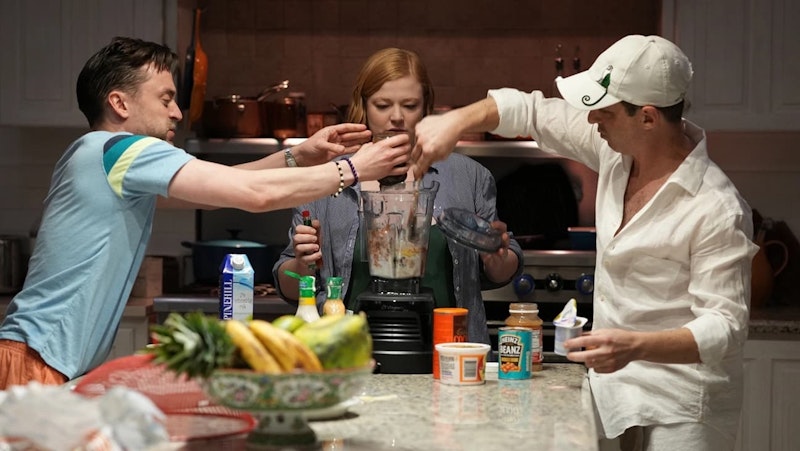Succession is over—an earth-shattering event for thousands of people. “I can’t believe I’ll never hear the #Succ theme song again,” “I’m so sad,” “I miss them already,” “Nauseated… sick…” “I hope Kendall and Stewie kiss.” Unlike Netflix, whose biggest successes quickly recede into oblivion—House of Cards, Orange is the New Black, Stranger Things, Birdbox—HBO has produced series that capture the zeitgeist and become legacy shows, known through osmosis even by people who’ve never seen a single episode: The Sopranos, The Wire, Sex and the City, Curb Your Enthusiasm, Girls, Game of Thrones, The White Lotus. But another show ended on Sunday night after four seasons on HBO, another one beloved by thousands of people: Barry, starring and largely written and directed by Bill Hader. That finale aired immediately after Succession, like most of this season; both have won multiple Emmy’s.
But Barry never entered the zeitgeist, as far as I can tell; Succession references and image grabs are everywhere, but I’ve watched every episode the night it aired since 2021. If I ever watched Barry, I’m sure I would see Hader and that donut a lot more. If Succession becomes a legacy show, with a Young Logan or The Adventures of Tom and Shiv’s Fucked Up Kid spinoff, it won’t be for the writing, superb as it is, but the media seeing themselves in it. Logan Roy told his kids “You are not serious people” right before he died, and that’s precisely what Succession fans want: serious material. I’m assuming!
Jesse Armstrong went out on top, with only one false saccharine note: the iPhone dinner party flashback with that weepy Irish song, something that never would’ve appeared in the abrasive first season. As brutal as the show continued to be, every episode after Logan died was inconsequential save for one major, blowout scene (Matsson, Kendall, and Roman on the cliff; Tom and Shiv in bed and on the balcony; Kendall’s Living+ speech). Brian Cox’s candor was endearing at first, especially when it was at the expense of his insane method acting coworker Jeremy Strong—“fucking annoying”—but his comments on BBC Two a couple weeks ago betray the kind of pettiness closer to one of the Roy kids than the man who played the king.
“I was fine with it ultimately, but I did feel a little bit rejected… You know, I felt a little bit like all the work I’ve done and finally I’m going to, you know, end up as an ear on a carpet of a plane.” That slow zoom in on his ear is one of the only moments in the series I still think about—who knows if that’ll be the case in a year, but Logan’s death was handled brilliantly. Too early? Perhaps, but Cox’s comments are also indicative of a problem inherit in all television that takes itself too seriously. As soon as you whittle down a season to 10 or fewer episodes, you’ve become “prestige,” a queasy middle ground between cinema and the sausage factory of network television.
On a network show like Cheers, Seinfeld, Friends, or The Office, all that matters are the characters. Plots are interchangeable. Things go back to the way they were week after week, with some changes here and there. Maybe towards the end, an actor leaves or someone has a baby, but if you’re watching Seinfeld, you’re watching the characters go through an isolated incident, not another “chapter.” As I wrote in CounterPunch in May, the prestige series has replaced the popular novel in American pop culture. That’s a much more narrow reach than network television, where tens of millions of people tuned in to watch certain shows end. Seventy million people never watched The Sopranos, let alone Succession.
In a streaming world, HBO isn’t the inaccessible luxury it was 20 or even 10 years ago. But with an abundance of material, even programs as popular as Succession and Barry can only grab so many people. And in all of the wrap-up columns and insane tweets, references to Shakespeare and Antigone are fueled by the same shallow excitement that comes with “appointment viewing” of years past. Cox is a decent actor, but he sounds like one of his own psycho fans, missing his favorite soap. If you want to fix everything, television shows should be made illegal aside from daily soap operas shot on video. Healthy programming for a growing nation.
—Follow Nicky Smith on Twitter: @nickyotissmith

